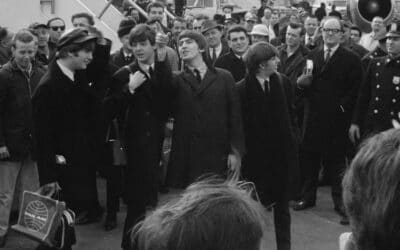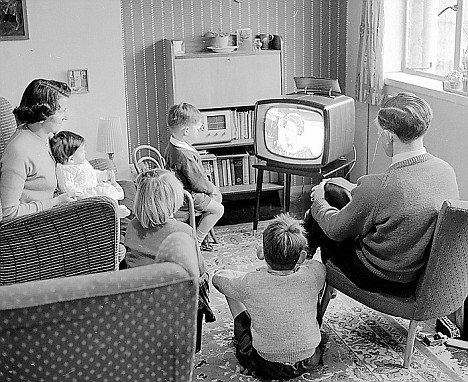 Picture: By Paul Townsend
Picture: By Paul TownsendTV Shows We Used To Watch – Christmas 1959.
Young people are turning away from watching television, according to industry analyst Claire Enders.
Speaking at the Royal Television Society in London conference yesterday, Enders said that over the past 18 months, there had been a 22 per cent fall in TV viewing among 4- to 15-year-olds and a 15 per cent drop in viewing among 16- to 34-year-olds.
Her findings align with reports from America where the same trend is being tracked. The data in the latest cross-platform report from Nielsen attests, the drop-off in viewing by the 18-24 demographic is intensifying again.
Nielsen’s most recent study (available to download here) indicates that Americans aged 18-24 watched a weekly average of a little less than 22 hours of traditional TV during Q1 2014. That was a 95-minute drop-off from Q1 2013, which in turn had been down by 80 minutes from the year before. In fact, in the space of 3 years, Q1 TV viewing by 18-24-year-olds dropped by a little more than 4-and-a-half hours per week. That’s a substantial amount, equivalent to roughly 40 minutes per day.
Speaking in London, Enders said: “All traditional media companies are affected by technological changes, so in this country whether it is newspapers or magazines or television, the increase in penetration of tablets and smartphones has had a substantial effect on consumption, particularly in younger demographics.”
She made the statement during a session entitled ‘The future you don’t want to face’, examining whether TV was losing power as a medium, the role of channels in the future, and where the money will be made.
It’s a trend which will further increase the fears about how future public service broadcasting is to be paid for for in the UK.
 Culture secretary Sajid Javid
Culture secretary Sajid Javid
And that topic was high on the agenda when the conference heard from the Culture Secretary Sajid Javid who brought forward a review of the licence fee which may lead to the decriminalisation of non-payment.
He said: “In 2012/13, almost 200,000 people ended up in court accused of not buying a TV licence. More than 50 were sent to prison. When over 10 per cent of Magistrate’s Court cases concern this one offence, you have to ask whether the current system is really working.”
In his first major major public speech on broadcasting since taking the job in April, he said the BBC “can and must” make more efficiency savings on top of the £800m of cuts it has already identified.
“The BBC gets £3.7bn (in annual funding). When you have an organisation that size, it’s not impossible to find savings if you try really, really hard. My view is that it can continue to work hard and more savings can be made.”







